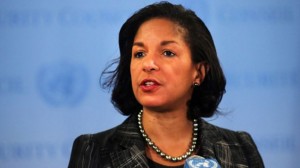 US national security adviser to hold high-profile talks in the region, centering on peace process, Iranian nuclear deal
US national security adviser to hold high-profile talks in the region, centering on peace process, Iranian nuclear deal
S President Barack Obama’s national security adviser, Susan Rice, arrived in Israel Wednesday along with an American delegation to the US-Israel Consultative Group, a forum for high-level talks between Jerusalem and Washington on bilateral and regional security issues.
Upon her arrival late Wednesday morning, Rice, who is a former US ambassador to the UN, tweeted that it was"great to be back"in Israel.
She also praised America’ssecurity cooperationwith Israel, which she said has “never been stronger.”
During her visit to the region, Rice is due to hold high-profile talks with Israeli and Palestinian leaders against the backdrop of rising hopes for an Iranian nuclear deal and faltering US-led peace talks with the Palestinians.
Undaunted by the challenging issues on the agenda, Rice tweeted Wednesday that she was “looking forward to robust and intensive consultations” with her counterparts in the region.
Rice’s trip — her first to Israel since assuming her White House post last year — has been long planned. She’s leading a contingent of US officials from the State and Treasury departments, Pentagon and intelligence community who hold regular discussions with their Israeli counterparts.
Palestinian media reported on Wednesday morning that Rice would also be traveling to Ramallah on Thursday to meet with Palestinian Authority leaders, no doubt to discuss the stalled peace process spearheaded by US Secretary of State John Kerry.
However, it is the Iranian negotiations in particular that are expected to factor into Rice’s talks Wednesday and Thursday, particularly in her meeting with Prime Minister Benjamin Netanyahu. The prime minister has been a vocal critic of the US-led nuclear negotiations with Iran, accusing Tehran of using the talks as a stalling tactic while it pursues a nuclear weapon.
White House spokesman Jay Carney said Tuesday that Rice’s meetings will not produce “any new development on the Iran front.”
“It’s an opportunity for representatives from the United States and Israel at high levels to discuss that issue, among many others,” Carney said.
The US and its negotiating partners — Britain, France, Germany, Russia and China — reached an interim nuclear accord with Iran late last year and are now holding delicate discussions on a final deal. Nuclear experts from each country were meeting in New York this week ahead of higher level talks scheduled in Vienna next week.
While the talks have yielded some positive signs, the toughest issues must still be negotiated and any deal could fall apart.
Obama and other top US officials have sought to convince Israel that the talks represent the best option for resolving the international community’s dispute with Iran peacefully. Israel sees the Iranian nuclear program as an existential threat and has resisted any suggestions that Tehran could be left with some nuclear capacity.
Iran says it is not seeking a bomb and is instead pursuing a peaceful nuclear program.
Despite being one of Obama’s closest foreign policy advisers, Rice has kept a relatively low-key public profile on both the Iran and Mideast peace issues, allowing Kerry to serve as the administration’s primary spokesman on the matters. Kerry has played a particularly hands-on role in the US-brokered peace talks, shuttling to the region frequently in an effort to jumpstart the floundering process.
But those talks broke down last month after Israel didn’t release a fourth batch of promised Palestinian prisoners and refused to freeze settlement building on land Palestinians want for a future state. Palestinian Authority President Mahmoud Abbas then sought recognition for “a state of Palestine” in 15 international treaties, breaking a previous commitment.
It appears unlikely that Rice will make a significant effort to restart the talks while in Israel. The State Department said last week that US envoy for Mideast peace Martin Indyk had come home from the region and had no immediate plans to return.
By The Times Of Israel
The Iran Project is not responsible for the content of quoted articles

 QR code
QR code